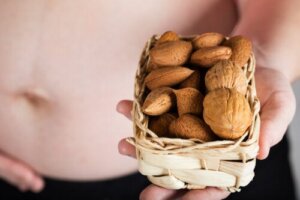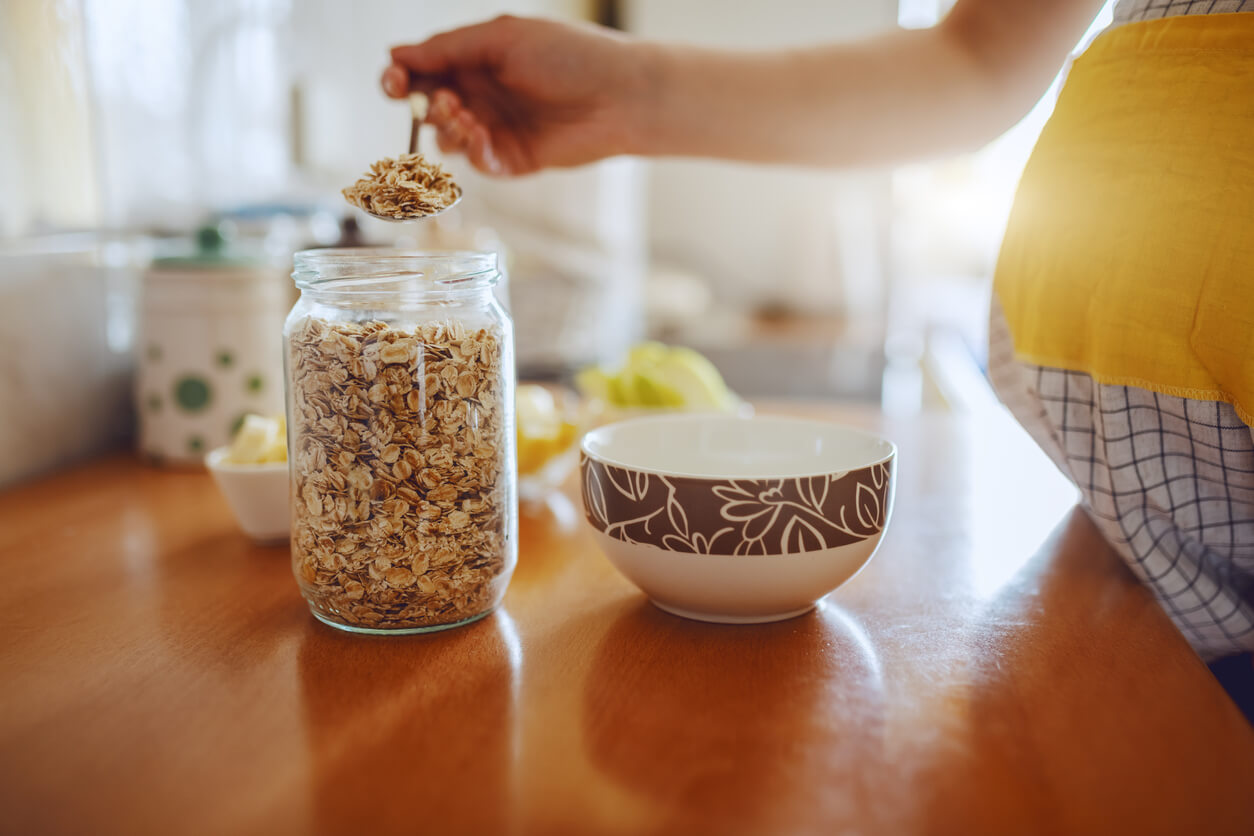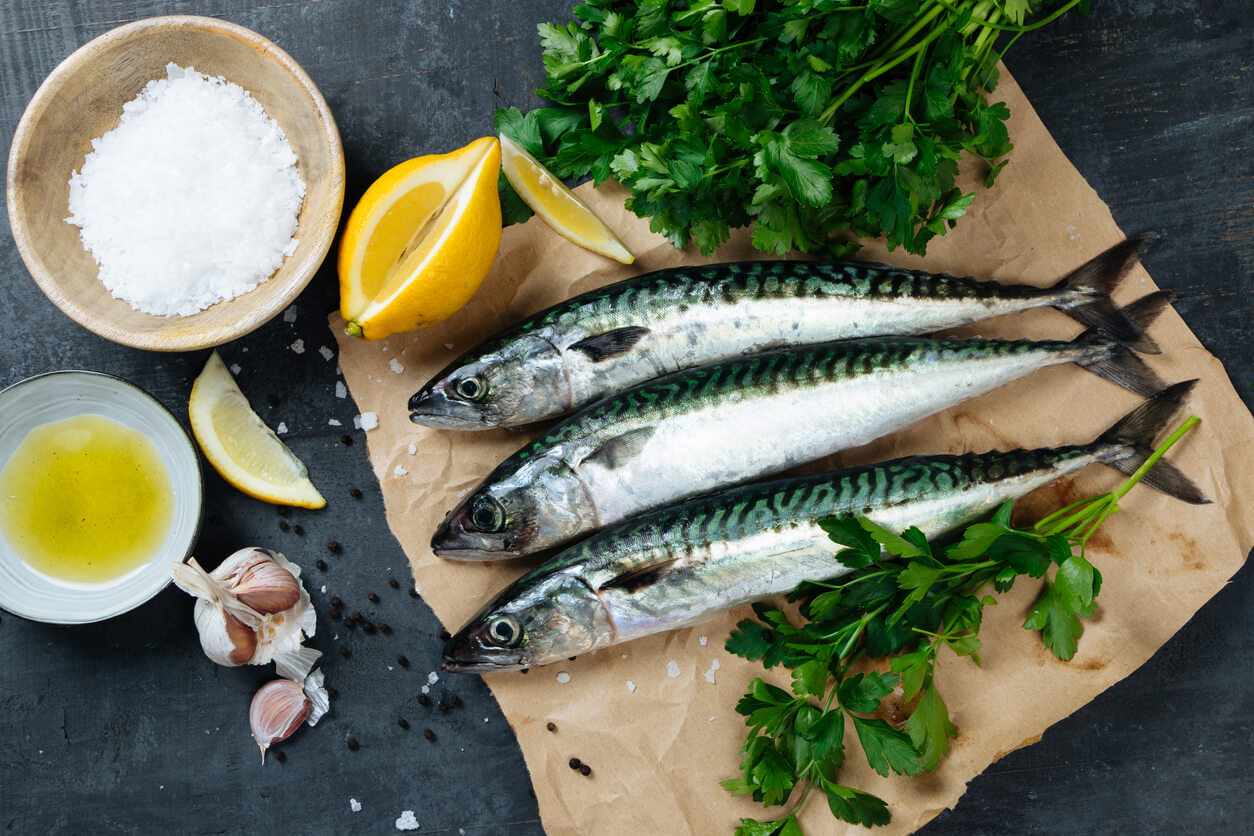5 Foods that Help Lower Cholesterol During Pregnancy

In pregnancy, metabolic changes occur that produce more glucose for the baby, more amino acids to form tissues, and enough lipids for the cells. However, when cholesterol increases considerably, it produces complications. Therefore, it’s important to take precautions in the diet and select foods that help lower cholesterol during pregnancy.
The variations inherent to pregnancy can increase cholesterol levels by up to 50%. This exorbitant increase can clog arteries and cause cardiac disorders. In this article, you’ll find out what foods to eat to get rid of high cholesterol and avoid increasing the worldwide statistics of cardiovascular complications.
Why does cholesterol increase during pregnancy?
Cholesterol is a component of fats that are involved in embryonic and fetal development. It’s used to form steroids and other components that will form part of cell membranes. It’s normal for total cholesterol (TC) levels to increase between 30 and 50% during pregnancy and then return to their initial values after delivery. However, when it rises above 300 milligrams, the situation is high-risk.
A group of experts explains that the highest lipid levels occur after the first trimester, which coincides with maximum fetal growth. According to them, the hormonal load of pregnancy, such as progesterone, estrogens, placental lactogen, and insulin resistance, helps to raise them.
What happens if high cholesterol persists during pregnancy?
The increase in blood cholesterol during pregnancy comes from the production of more lipids by the body and from the diet. To circulate in the blood it has to use a special transport known as lipoproteins, LDL, HDL, or VLDL. When LDL cholesterol is too high, it obstructs the walls of the arteries. Therefore, the passage of blood through the blood vessels is impeded, which causes cardiovascular diseases.
Other complications have to do with premature delivery, preeclampsia, eclampsia, gestational diabetes, heart problems, heart attack, and metabolic disorders in the newborn. Faced with these health problems, it’s imperative to take dietary measures by selecting foods that help lower cholesterol in pregnancy.

Discover which foods help lower cholesterol during pregnancy
Here are the foods you should eat to lower or prevent an increase in cholesterol during pregnancy.
1. Foods rich in fiber
Soluble dietary fiber, such as beta-glucans, mucilage, gums, inulin, resistant starch, and pectin, increase intestinal viscosity and trap bile acids formed from cholesterol. They’re then excreted with feces.
A review conducted in 2016, states that the consumption of 3 grams of beta-glucan reduces blood cholesterol and prevents cardiovascular diseases. Oats, barley, corn, legumes, citrus fruits, guava, mango, and peppers are sources of soluble fiber.
In addition, insoluble fiber, found in wheat bran, whole grains, legumes, and leafy greens, also helps prevent constipation, which is common in pregnancy.
Read also: 4 Remedies Against Pregnancy Constipation
Olive oil
The effect of olive oil as a protector against cardiovascular diseases is long-standing. Its effect is explained by the presence of oleic fatty acid, an omega-9 that’s capable of reducing cholesterol levels, as explained in the journal Clinical and Research in Arteriosclerosis. The Mediterranean diet includes it for its obvious health benefits, not to mention its antioxidant and anti-inflammatory effects.
3. Consume garlic
A 2006 study confirmed the cardiovascular protective effect of garlic by reducing LDL cholesterol and preventing the formation of plaques that block arteries. Another study found that in animal models, the consumption of 5 grams of raw garlic twice a day for 42 days was able to reduce blood cholesterol.
4. Oily fish

Oily fish such as salmon, mackerel, sardines, herring, and permit, among others, are rich in fatty acids, eicosapentaenoic (EPA), and docosahexaenoic (DHA). Revista Med explains that these are polyunsaturated fats of the omega-3 series, which reduce the risk factors for cardiovascular diseases.
It’s a good idea to consume these fish 3 to 4 times a week when lowering cholesterol is necessary, or 1 to 2 times per week as a preventive measure. For this, they should be grilled, baked, or made using any other preparation that doesn’t include frying. Another way to consume this type of fat is through supplements, at the rate of 2 capsules with meals. For this, you should consult with your treating physician.
5. Nuts and sunflower seeds, chia, sesame, and flaxseed
Oilseeds, such as chia, sesame, or sunflower seeds and nuts, contain alpha-linolenic fatty acid (ALA), an essential fat of the omega-3 series, which is a precursor of polyunsaturated DHA and EPA. These can be consumed with water, combined with yogurt, bread, tortillas, smoothies, or healthy desserts.
Read also: Healthy Snacks for Pregnant Women
A balanced and healthy diet is key
Experts recommend maintaining a balanced and healthy diet to prevent an excessive increase in cholesterol during pregnancy. Remember that your pregnancy should go hand in hand with your obstetrician and nutrition professional. An optimal intake of fiber through fruits, fresh vegetables, cereals, and legumes is key, as well as increasing the consumption of foods that are a source of omega-3 and using extra virgin olive oil as a dressing.
In pregnancy, metabolic changes occur that produce more glucose for the baby, more amino acids to form tissues, and enough lipids for the cells. However, when cholesterol increases considerably, it produces complications. Therefore, it’s important to take precautions in the diet and select foods that help lower cholesterol during pregnancy.
The variations inherent to pregnancy can increase cholesterol levels by up to 50%. This exorbitant increase can clog arteries and cause cardiac disorders. In this article, you’ll find out what foods to eat to get rid of high cholesterol and avoid increasing the worldwide statistics of cardiovascular complications.
Why does cholesterol increase during pregnancy?
Cholesterol is a component of fats that are involved in embryonic and fetal development. It’s used to form steroids and other components that will form part of cell membranes. It’s normal for total cholesterol (TC) levels to increase between 30 and 50% during pregnancy and then return to their initial values after delivery. However, when it rises above 300 milligrams, the situation is high-risk.
A group of experts explains that the highest lipid levels occur after the first trimester, which coincides with maximum fetal growth. According to them, the hormonal load of pregnancy, such as progesterone, estrogens, placental lactogen, and insulin resistance, helps to raise them.
What happens if high cholesterol persists during pregnancy?
The increase in blood cholesterol during pregnancy comes from the production of more lipids by the body and from the diet. To circulate in the blood it has to use a special transport known as lipoproteins, LDL, HDL, or VLDL. When LDL cholesterol is too high, it obstructs the walls of the arteries. Therefore, the passage of blood through the blood vessels is impeded, which causes cardiovascular diseases.
Other complications have to do with premature delivery, preeclampsia, eclampsia, gestational diabetes, heart problems, heart attack, and metabolic disorders in the newborn. Faced with these health problems, it’s imperative to take dietary measures by selecting foods that help lower cholesterol in pregnancy.

Discover which foods help lower cholesterol during pregnancy
Here are the foods you should eat to lower or prevent an increase in cholesterol during pregnancy.
1. Foods rich in fiber
Soluble dietary fiber, such as beta-glucans, mucilage, gums, inulin, resistant starch, and pectin, increase intestinal viscosity and trap bile acids formed from cholesterol. They’re then excreted with feces.
A review conducted in 2016, states that the consumption of 3 grams of beta-glucan reduces blood cholesterol and prevents cardiovascular diseases. Oats, barley, corn, legumes, citrus fruits, guava, mango, and peppers are sources of soluble fiber.
In addition, insoluble fiber, found in wheat bran, whole grains, legumes, and leafy greens, also helps prevent constipation, which is common in pregnancy.
Read also: 4 Remedies Against Pregnancy Constipation
Olive oil
The effect of olive oil as a protector against cardiovascular diseases is long-standing. Its effect is explained by the presence of oleic fatty acid, an omega-9 that’s capable of reducing cholesterol levels, as explained in the journal Clinical and Research in Arteriosclerosis. The Mediterranean diet includes it for its obvious health benefits, not to mention its antioxidant and anti-inflammatory effects.
3. Consume garlic
A 2006 study confirmed the cardiovascular protective effect of garlic by reducing LDL cholesterol and preventing the formation of plaques that block arteries. Another study found that in animal models, the consumption of 5 grams of raw garlic twice a day for 42 days was able to reduce blood cholesterol.
4. Oily fish

Oily fish such as salmon, mackerel, sardines, herring, and permit, among others, are rich in fatty acids, eicosapentaenoic (EPA), and docosahexaenoic (DHA). Revista Med explains that these are polyunsaturated fats of the omega-3 series, which reduce the risk factors for cardiovascular diseases.
It’s a good idea to consume these fish 3 to 4 times a week when lowering cholesterol is necessary, or 1 to 2 times per week as a preventive measure. For this, they should be grilled, baked, or made using any other preparation that doesn’t include frying. Another way to consume this type of fat is through supplements, at the rate of 2 capsules with meals. For this, you should consult with your treating physician.
5. Nuts and sunflower seeds, chia, sesame, and flaxseed
Oilseeds, such as chia, sesame, or sunflower seeds and nuts, contain alpha-linolenic fatty acid (ALA), an essential fat of the omega-3 series, which is a precursor of polyunsaturated DHA and EPA. These can be consumed with water, combined with yogurt, bread, tortillas, smoothies, or healthy desserts.
Read also: Healthy Snacks for Pregnant Women
A balanced and healthy diet is key
Experts recommend maintaining a balanced and healthy diet to prevent an excessive increase in cholesterol during pregnancy. Remember that your pregnancy should go hand in hand with your obstetrician and nutrition professional. An optimal intake of fiber through fruits, fresh vegetables, cereals, and legumes is key, as well as increasing the consumption of foods that are a source of omega-3 and using extra virgin olive oil as a dressing.
All cited sources were thoroughly reviewed by our team to ensure their quality, reliability, currency, and validity. The bibliography of this article was considered reliable and of academic or scientific accuracy.
- Aparicio Vizuete, Aránzazu, & Ortega Anta, Rosa María. (2016). Efectos del consumo del beta-glucano de la avena sobre el colesterol sanguíneo: una revisión. Revista Española de Nutrición Humana y Dietética, 20(2), 127-139. https://dx.doi.org/10.14306/renhyd.20.2.183
- Martínez P, López-Miranda J, Delgado-Lista J, López-Segura F, Pérez Jiménez F. 2006. Aceite de oliva y prevención cardiovascular: más que una grasa. Clínica e Investigación en Arteriosclerosis. Vol. 18. Núm. 5. páginas 195-206.
- Aller, Luis, D. A. de, & R.. (2008). Ajo y riesgo cardiovascular. Anales de Medicina Interna, 25(5), 237-240. Recuperado en 24 de enero de 2023, de http://scielo.isciii.es/scielo.php?script=sci_arttext&pid=S0212-71992008000500010&lng=es&tlng=es.
- Mahmoodi M, Islami MR, Asadi Karam G, Khaksari M, Sahenghadam Lotfi A, 2006. Study of the effect of raw garlyc consumption on the level of lipids and other blooddbiochemical factors in hyperlipidemic individuals. Pak J Pharm; 19: 295-8
- Gómez de Berrazueta, Juan Manuel; de Berrazueta, José Ramón. 2007. Consumo de pescado, omega- 3 y factores de riesgo cardiovascular Revista Med, vol. 15, núm. 2, pp. 218-224
- Mauri M, Calmarza P, Ibarretxe D, 2021. Dislipemias y embarazo, una puesta al día, Clínica e Investigación en Arteriosclerosis, Volume 33, Issue 1, Pages 41-52, ISSN 0214-9168,https://doi.org/10.1016/j.arteri.2020.10.002. (https://www.sciencedirect.com/science/article/pii/S0214916820301066)
This text is provided for informational purposes only and does not replace consultation with a professional. If in doubt, consult your specialist.








